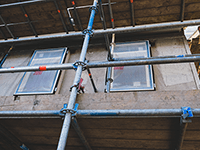
People have access to a huge range of different finance options when it comes to funding their plans. But, with so many choices available it can be hard for you to know which type is the right fit.
Luckily, we can help guide you through the process. In this blog, we’ll highlight when it could be useful to get a bridging loan and cover the most common uses to help you understand when to consider this solution.
1. Buy a property
A lot of people choose to fund new house purchases by selling a property they own, but problems can arise when the timing doesn’t quite line up. In this situation, getting a bridging loan could help.
By using this option, you can get the funds needed for the new property purchase, whilst you’re waiting for your house to sell. When your house does eventually sell, you can use the proceeds to pay off your loan. Therefore, with this option, you can make sure you don’t miss out on your dream house, so it can be a good solution to consider in these circumstances. This is commonly known as chain break bridging.
2. Buying property at auctions
Buying a property at auction can be exciting. But, what happens if you don’t have the funds readily available to complete your purchase? Well, if you want things to go through smoothly you’ll need access to funds quite quickly.
It is therefore worth looking into a short-term funding option, such as auction finance. With this solution, you’ll be able to get money fast, allowing you to pay for your auction property with little delay. This will make sure that you don’t encounter any problems with the auctioneer and help you get the property you want.
3. Fund light or heavy refurbishments
Refurbishments can be tricky, as some lenders may be reluctant to offer you finance if they think the property is not in a suitable condition for renting or a mortgage. Although this can be hard to navigate there are solutions available, one of which includes refurbishment bridging loans. By using this option, you can fund your renovation plans quickly and get the property to a suitable standard. Once these works have finished, you can apply for alternative finance.
4. Commercial property investment
When an investment opportunity arises it is really important to be quick. If you’re too slow, you may not get the deal you wanted or you might miss out completely. Therefore, being able to access funds quickly is particularly key.
If you’re a keen investor you may find that your money is already in other properties or assets, and therefore you need to rely on another funding solution to help you. In this case, a commercial bridging loan could be beneficial, as it can be much faster compared to other types of finance. As a result of this, you may be able to get the money you need to fund your investments and expand your business portfolio.
5. Short-term business expenses
If you’re a business owner you may find that sometimes you have short-term expenses that you need to pay quite quickly, such as a tax bill. But, if these expenses come through unexpectedly and you don’t have the money available, you may start to panic.
By taking out a bridging loan, you may be able to cover these expenses and make sure that you don’t run into any problems. However, you must think carefully about how you plan to repay the loan, as lenders will be reluctant to approve your application unless they can see that you have a clear exit plan.
However, bridging loans are secured against your property. Therefore, before you make any decisions it’s important to ensure you have a good plan to repay the loan before the end of the term to avoid the property being repossessed.
What else can a bridging loan be used for?
Some of the other common uses include:
- Capital raising
- Property development finance
- Land purchase pre planning
- Gifted transactions
- To cover cash flow needs
- Conversions and title splits
- Site acquisition
- Planning applications
Summary
In summary, this finance option can be useful when it comes to funding certain plans, particularly ones that need to be fulfilled quickly. But, it’s always important to think about your exit plan first before you make any final decisions.
Any property used as security, which may include your home, may be repossessed if you do not keep up repayments on your mortgage.




